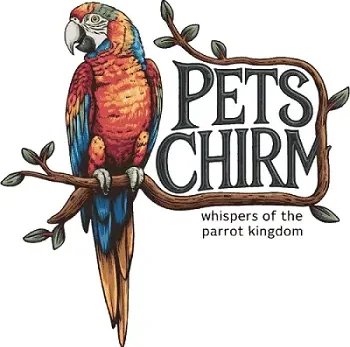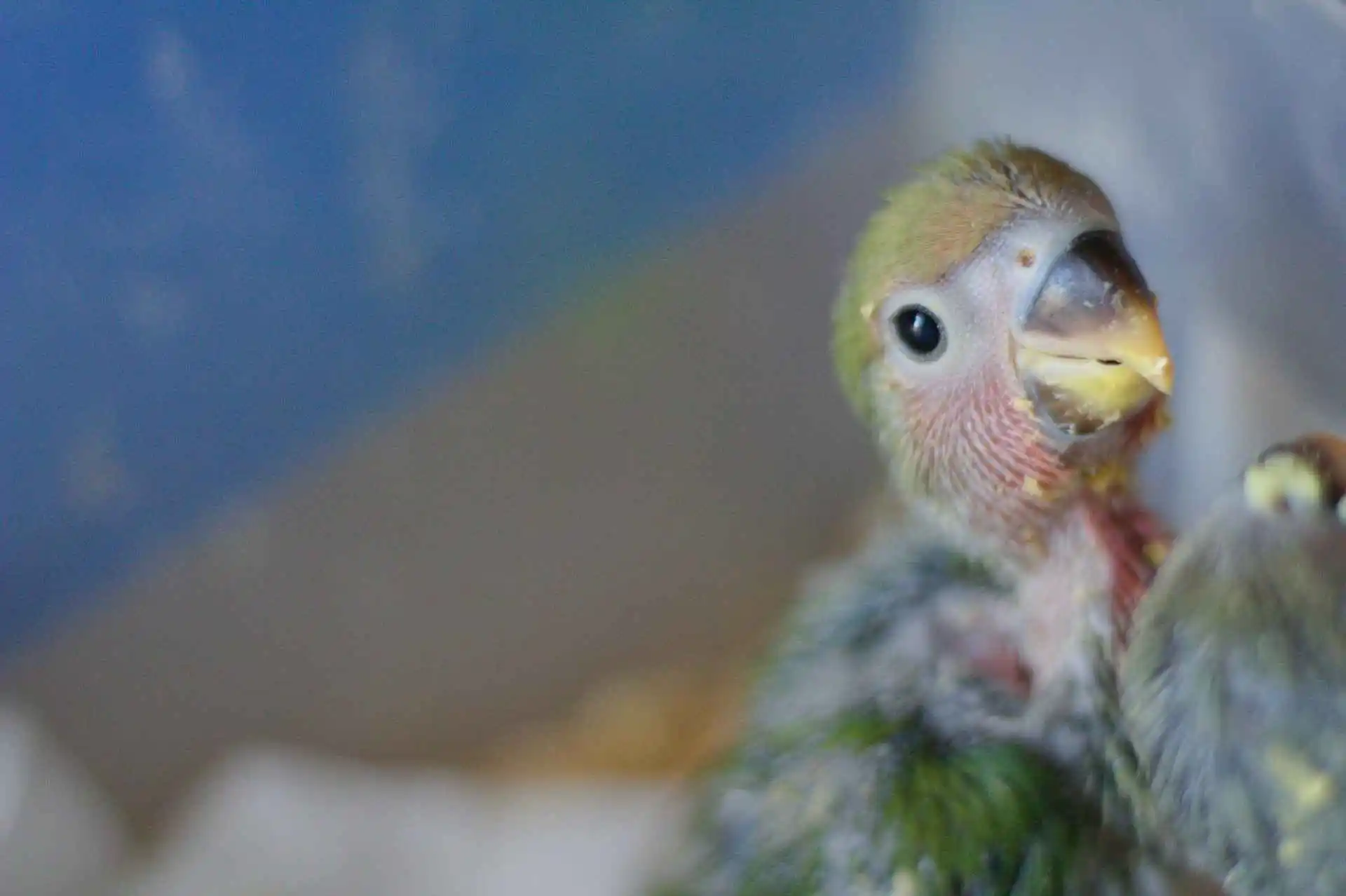Parrot babies are also known as chicks that are very sensitive because they come into a new world. To keep them healthy there should be a good maintainable environment, with maintained humidity and a good diet which can complete their nutrition requirements and help them to grow faster without any problem or disease. Here’s a brief overview for baby parrot owners, especially for those who are just getting their first experience
Understanding Parrot Baby Needs
Parrot babies are highly dependent on their owners. The first days are very sensitive if the parrot baby gets proper care and diet at the time he easily emerges as a healthy and beautiful parrot.
Temperature Maintenance:
A warm environment is better for parrot babies which keeps their body to regulate well.
To keep the temperature warm there are several instruments but as simple as putting the chicks in a box with high sides and a bulb hanging on it which keeps the temperature warm. Also, check the temperature of the box time by time so that the temperature becomes very hot for his body.
Best Diet:
Parrot babies require a fresh and healthy diet enriched with all nutrients that are essential to growth and make the body prepare to do all functions properly.
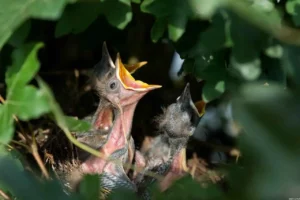
Building Relations:
Building relations and socialization with chicks is important as it removes the fear of the owner at the start which mostly parrots have. Moreover, this helps him to eat the food easily without any hesitation from you.
Ideal Nutrition for Baby Parrots
Here are some ideal nutrition requirements and some advice related to the environment that helps your chicks to grow faster and healthy.
Protein is necessary to build up muscles, calcium is necessary for bones, and skeletal while carbohydrates and fats are necessary to give energy for daily life activities.
There are some feed formulas designed to give parrot babies which are useful for them. Moreover, you can also give them rice, with mesh fruits so they can easily swell it.
Proper Feeding Schedule and Diet
According to their development or growing stage, parrot babies should be fed.
For the first two weeks of his life, feed him every 2 to 3 hours regularly.
After the new parrot baby’s first 2 weeks, give him his diet for 3 to 4 hours regularly.
Now after the first 7 to 8 weeks, you give him a proper solid food diet including seeds, cracked nuts, foods, vegetables, and a variety of food.
Feeding Techniques for Baby Parrots
There are some feeding techniques through which we give the parrot baby his diet. The common and main techniques are given below.
Syringe:
The syringe is the most common and best way to give a parrot baby his diet. Due to this, we prevent the problem of overfeeding.
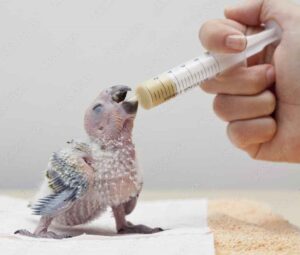
Spoon:
Spoon is also used to give the parrot baby his diet.
By Hand:
Mostly people feed their chicks with their hands. This is not the wrong way yet this is also best.
Remember not to hardly force them to eat their diet. Maybe by doing this, the diet can stuck inside their neck which can create serious problems.
Temperature and Lighting Requirement
For a Parrot baby, 24-29 or 30 degree celsius temperature is very best to keep them warm.
Keep your parrot in sunlight so it helps to maintain his body temperature. Moreover, parrot babies also get vitamin D from sunlight, which is necessary as it helps calcium to be stored in the bones.
Avoid direct sunlight on your baby parrot as it causes dehydration or overheating, which is harmful to parrots.
If you don’t want sunlight then choose a full spectrum bulb for 10-12 hours, also remember to keep checking the temperature of the baby parrot’s box so it may not exceed the limit.
Parrot baby also wants 10-12 hours of regular sleep.
Hygiene and Cleanliness
Take care of the cleanliness of the cage. Regularly clean or wash the cage, the toys, and everything in the cage to avoid any bacteria.
Also, keep the water and food in small boxes clean by removing the previous water and food then clean them and put fresh water and food, so that bacteria doesn’t grow there.
Keep your hands washed and clean before handling the parrot baby.
Common Health Issues in Parrot Babies
There are some health issues that many parrot babies face. Some of them are given below.
Crop Impaction:
This is the problem in which food becomes stuck in the crop, crop is the part which is near to the throat.
Breathing Infections:
Such types of infections are caused by bacteria, contaminants, or fungi. It causes difficulty in breathing or sneezing etc.
Vitamin Deficiency:
Mostly parrot babies are infected with vitamin A deficiency which causes several problems like feather problems, and improper growth.
Calcium Deficiency:
Calcium deficiency in parrot babies causes bone weakness and bone problems.
Sour Crop:
In this disease, food elements in the crop promote bacterial growth which can further cause several problems. This problem can be solved by checking before feeding whether the crop is empty or not.
Recognizing Signs of Illness
Here are some signs from which you detect whether your parrot baby is infected or not.
Some of the symptoms are given below.
- Weakness
- Parrot is unwilling to eat or drink.
- Start feather plucking
- Starts aggression or biting
- Parrot decrease his activity level to his surroundings.
If you notice such behaviors you should consult with an expert vet. Otherwise, you should do regular or weekly checkups of your parrot baby with a vet so maybe he finds some inner hidden diseases
Managing Stress in Baby Parrots
Parrots are very sensitive to the environment so their babies are also very sensitive. A change in environment or place is enough to increase their stress or tension level.
Create an environment for their enrichment with toys and their favorite treat or diet.
Building Trust with Baby Parrots
Try to build the trust with your parrot baby. This is very necessary. By Building a relationship with your parrot baby it’s very easy to give him his diet.
Don’t create a loud noise around your parrot, try to talk to him with a soft and calm voice with affection. Try to make a bond with your parrot with his favorite treat which he mostly likes. Give him treats with affection and kindness.
Handling and Training Basics
Training is the most important part for parrot babies, it tells them what’s good and what’s bad behavior. It also tells them not to bite, and obey the owner.
There are some steps by which you give your parrot baby a well-training.
Positive Reinforcement:
Positive reinforcement is a technique by which you tell your parrot that what’s right and what’s wrong. In this technique, if your parrot does something good or obeys you, you urgently give him affection with his favorite treat and if your parrot does wrong behavior you will not give him any treat or affection. This is a very useful technique.
Now it’s time to do some short sessions in which you use a clicker and a small stick to give him some basic commands which are come here, sit down, climb up, etc.
If you want a detailed overview of the training of parrots click here.
Tracking Physical and Mental Growth
Here are some ways in which you can check your parrot baby’s physical and mental growth.
Physical Growth:
Check your parrot baby’s physical growth with any weight-checking instruments in grams. Moreover, you can also see your parrot baby’s growth by checking his feather’s growth.
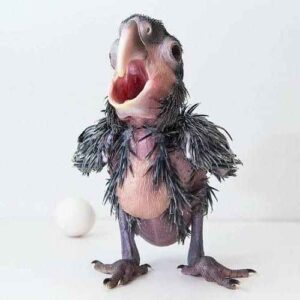
Mental Growth:
You can monitor your parrot’s mental growth by checking his behavior with toys and with his surroundings including you and other people.
| Aspect | Details |
|---|---|
| Sensitivity | Parrot babies (chicks) are very sensitive and require careful handling and care. |
| Temperature Maintenance | Ideal temperature is between 24-30°C. Use a warm box with a light bulb for heat. |
| Best Diet | The ideal temperature is between 24-30°C. Use a warm box with a light bulb for heat. |
| Feeding Schedule | Feed every 2-3 hours for the first two weeks, then every 3-4 hours, transitioning to solid food by 7-8 weeks. |
| Feeding Techniques | Common techniques include syringes, spoons, or hand feeding. Avoid forcing food into the chick. |
FAQs
1- What’s the ideal temperature for baby parrots?
The ideal temperature for baby parrots is between 24- 30 °C. It’s essential to maintain a warm terrain to help them regulate their body temperature effectively.
2- How frequently should I feed my baby pantomime?
Baby parrots should be fed every 2- 3 hours during the first two weeks of life. After that, the feeding schedule can be acclimated to every 3- 4 hours, transitioning to solid food by 7- 8 weeks.
3- What are common health issues in baby parrots?
Common health issues include crop impaction, breathing infections, vitamin scarcity, calcium scarcity, and sour crops. Monitoring for these conditions is pivotal for the well-being of your baby pantomimist.
4- How can I tell if my baby pantomime is sick?
Signs that your baby pantomimist may be sick include weakness, reluctance to eat or drink, feather plucking, increased aggression, and dropped exertion levels. However, consult a veterinarian, If you notice these symptoms.
5- How can I make trust with my baby pantomimist?
structure trust with your baby pantomimist involves gentle running, speaking vocally, and using treats to produce a positive bond. This approach helps them feel safe and encourages them to accept food and commerce from you.
If you’re interested in gardens then you should visit these websites shimmerwise
